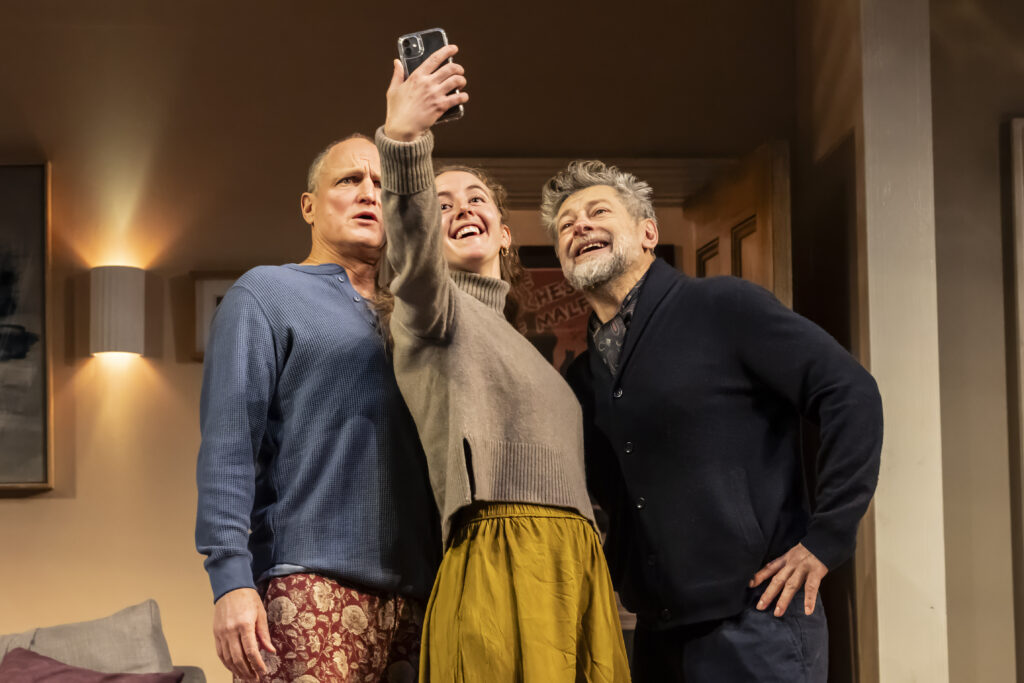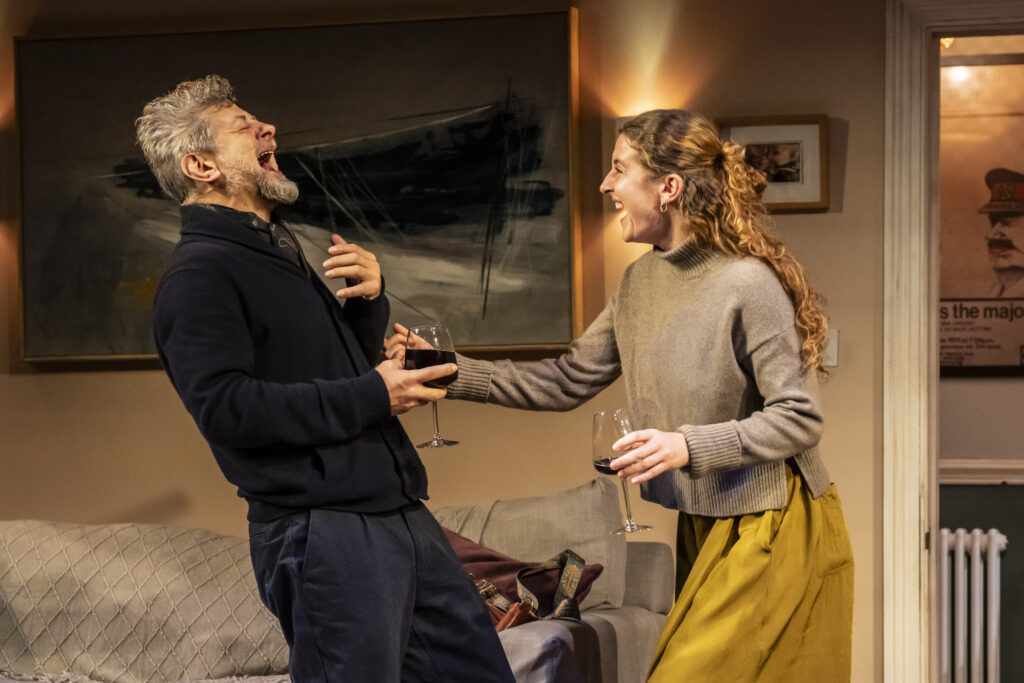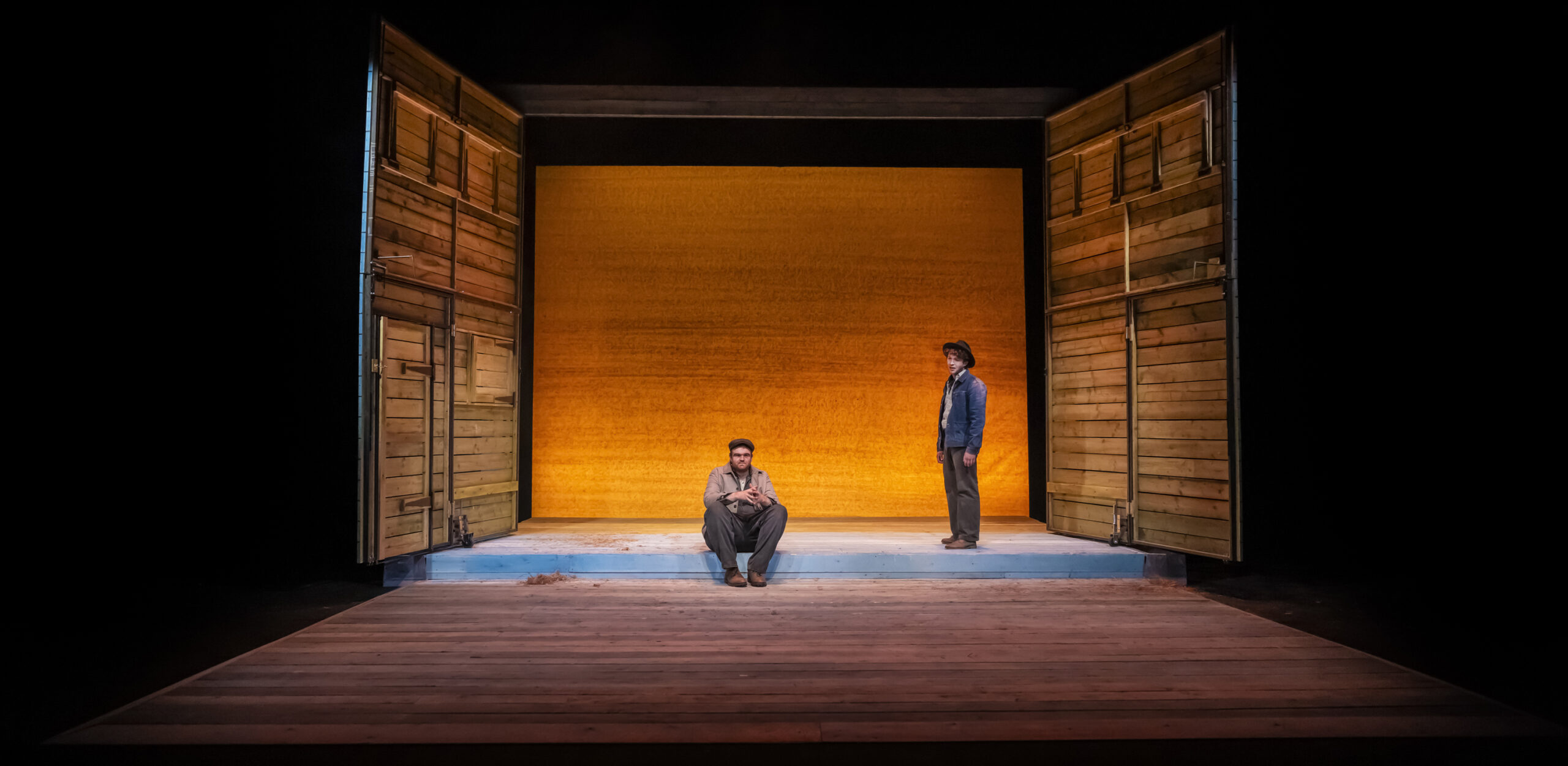
Ulster American review – Riverside Studios, London
Rating: ★★★★★
There’s leaving it late and there’s opening a play two and a half weeks before New Year’s Eve and delivering the production of the year. David Ireland’s play Ulster American is a perfectly crafted comedic masterpiece for the modern age and in Jeremy Herrin’s production, the stars (of stage and screen) align to deliver the best piece of theatre I have seen this year. I can’t recall the last time I laughed so much over the course of 100 minutes.
The play sees the American Oscar-winner Jay Conway (Woody Harrelson), English director Leigh Carver (Andy Serkis) and Northern Irish playwright Ruth Davenport (Louisa Harland) meeting at Leigh’s home the night before rehearsals begin for Ruth’s new play.
Jay has been wooed by Ruth’s text and is bringing the might of Hollywood to the London stage (so far so meta). The play is already sold out on account of Jay’s name, but the leading man has a few questions about the text. Namely: can he wear an eye patch, what is ‘Ulster’, and can the Irish-American’s character Tommy switch allegiances from the UDA to the IRA?

It feels important to declare up front that I’m Irish and I’m from the part of the country that Ireland is writing about; my hometown is even name-checked. I say that because Ireland perfectly captures some of the people I have personally met over the years; the American who doesn’t understand the complexity of Ireland and isn’t really trying to, and the Englishman who understands but just doesn’t care. Does it verge on stereotype? Not quite – it’s more like caricature, and with the play teetering on the line between comedy and farce, don’t all good plays of the genre require a little rounding of character?
Ireland also draws a parallel between the American and English approach to the island of Ireland, both those who identify as Irish and those who identify as British, and the male approach to women; nod knowingly and then tell them why they’re wrong.
Americans and the English aren’t the only people in Ireland’s sights. Theatre critics come in for particular treatment (this review is not an attempt to avoid Ireland’s crosshairs), as do actors and directors (not really artists, says Jay), Hollywood hypocrisy, misogyny, violence against women and social media cancellation. All of this is done with incredible comic verve; I would say it’s a laugh a minute but it’s much, much more than that.

But Ireland has an incredible ability to make you laugh out loud at something and cause you to immediately question whether you should have laughed in the first place. Whether you enjoy the play will partially depend on how much you can stomach the outrageous and offensive comedy and content. Jay likes to talk and nothing is off limits for his consideration. We open with a discussion about the use of the N-word and before Ruth’s arrival, the two men contemplate who they would rape ‘if they had to.’
The cast is extraordinary with Harrelson delivering a masterclass in acting. His physical comedy is perfect; he preens and pouts, jaw jutting as he contemplates Ruth’s challenges to Jay’s sense of self, he descends into yoga poses as he pontificates and simmers into meditation in an attempt to keep his cool. He’s a comic Midas – quite literally everything he does is funny and he looks like he’s having incredible fun doing it all; with 18 years since his last time on stage, you hope the next time comes much sooner.

Serkis is a joy as the director who is caught in the middle of his star and his writer, trying to placate everyone but with his foot permanently in his mouth. The rising Harland matches them. She brings a fierce independence and self-assurance to Ruth; you know that she is steadfast in her opinions, whether you agree with them or not.
In the programme, Harrelson talks about the comparisons between David Ireland and Martin McDonagh, who he worked with on Seven Psychopaths and Three Billboards Outside Ebbing, Missouri, where he gained one of his three Oscar nominations. While there are many similarities, the difference between the two is that McDonagh’s Irish plays are about an Ireland that never really existed, whereas David Ireland touches on the reality of Ireland: the complexities, the nuance and, arguably, the truth.
Ireland’s play Cyprus Avenue captured the paranoia of a certain generation in Ireland who can’t help but continue to cling onto their long-held convictions about ‘the other side’ even now that the Troubles are over, while Ulster American captures the experience of a new generation who are being told what their experience was, is, and should be. Ruth might be the opposite to me in many ways but her experience is exactly the same. We laugh about it, that’s what you do to cope with it, but all of it is true – and that is the real value in David Ireland’s play; it’s all true.
Ulster American is at Riverside Studios until 27 January 2024















